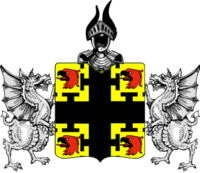User:Cosmic Fury/Sandbox
The The Beihagh Treaty, is the final draft of the Treaty between the Imperial Federation and Constancia set forth in 1740 AN, after successful conclusion of the Rusjar Negotiations over the status of Beihagh. The treaty was based off the comprehensive agreement wrote at the event between the parties' delegations (known as the Rusjar Accords or Beihagh Accords), then written more thoroughly in the immediate aftermath of these events. The treaty permanently settled the long-standing issue of sovereignty over the island that first emerged in the wake of the Norasht Campaign and subsequent joint occupation of the island by Suren and the Imperial Federation in 1722 AN. In the midst of the Integration of Suren, Constancia saw the need to settle the question, and invited delegations to Rusjar to negotiate a suitable conclusion.
The treaty also laid the groundwork for building a closer friendship between the two nations, formerly tied only by their mutual cooperation within the larger frame of the Raspur Pact. It thus represents the foundation of direct cooperation between the two powers, especially with regards to mutual military security within Eura.
The long form of the treaty is: The Treaty of Perpetual Cooperation and Friendship, and Definitive Resolution of Sovereignty over Beighagh Between the Imperial Federation of Ralgon, Eternia, and Haifa and the Imperial State of Constancia
Text
THE BEIHAGH TREATY
OR
THE TREATY OF PERPETUAL COOPERATION AND FRIENDSHIP, AND DEFINITIVE RESOLUTION OF SOVEREIGNTY OVER BEIHAGH
BETWEEN
IMPERIAL FEDERATION OF RALGON, VALORA, ETERNIA, AND HAIFA
AND
THE IMPERIAL STATE OF CONSTANCIA
Emperor Anarion the Great of The Imperial Federationand
Her Imperial Majesty, Esmeralda al-Osman, the Basilinna of the Imperial State of Constancia
The Imperial State of Constancia and the Imperial Federation (hereafter called “Parties” or “Party”), desirous of strengthening the bonds of peace and friendship traditionally existing between them and of encouraging closer economic and cultural relations between their peoples, and being cognizant of the contributions which may be made toward these ends by arrangements promoting mutually advantageous trade, encouraging mutually beneficial investments, and establishing mutual rights and privileges, have resolved to conclude a Treaty of Perpetual Cooperation and Friendship (which may be known as the Beihagh Treaty)Article I – Peace and friendship
There shall be a firm and perpetual state of peace and friendly relations between His Excellency, the Emperor of the Imperial Federation, Her Imperial Majesty, the Basilinna of the Constancia, and between Their Heirs or Successors, and between the Imperial Federation of Ralgon, Valora, Eternia, and Haifa, and the Imperial State of Constancia, in this treaty the High Contracting Parties, and between their Citizens, without discrimination.Article II - Sovereignty and territorial integrity
Each High Contracting Party shall respect the independence, sovereignty and territorial integrity of the other party. The High Contracting Parties shall continue to develop and consolidate the relations of sincere friendship, good neighbourliness and comprehensive cooperation existing between them on the basis of the aforesaid principles as well as those of equality and mutual benefit.Article III - Airspace
- Each High Contracting Party commits that any overflight of its airspace by aircraft registered upon the territory of the Other High Contracting Party, whose source and destination are outside the jurisdiction of the Overflown High Contracting Party and which make no intermediate landing upon the territory of the Overflown High Contracting Party, shall be considered to fall outside the remit of customs or immigration regulations and wholly outside the jurisdiction of any Third Parties, without prejudice to the exclusive right of the Overflown High Contracting Party to approve or deny such overflight as it sees fit.
- The High Contracting Party can set up a Prohibited Airspace, where an overflight is strictly prohibited. The High Contracting Party shall inform the other about Prohibited Airspace and appropriate punitive measures, in the event of an overflight of an aircraft registered with the other High Contracting Party.
Article IV – Diplomatic mission
- The High Contracting Parties will maintain regular contacts with each other on major international and regional problems affecting the interests of both of their countries and governments by means of meetings, and exchanges of views between their leading statesmen, visits by official delegations and special envoys of the governments, and through diplomatic channels.
- The High Contracting Party will make an embassy and consulates-general, consulates, and honorary consuls available for each other. For the embassy, consulates-general, consulates, honorary consuls, associated grounds, associated vehicles, leading statesmen, visits by official delegations, special envoys of the governments and ambassadors, diplomatic immunity applies.
- Each High Contracting party recognizes and respects the procedures of acceptance by the ambassador, by handing over a letter of credence, which is addressed from one head of state to the other asking to give credence.
Article V - Recognition of bureaucracy
Each High Contracting Party gives to the other full faith and credit to all public acts, records, contracts and judicial proceedings in the field of civil law, including records and documents on marriage, property, titles, death and inheritance, in as much as any act, record, document, contract, proceeding is done according to the law.Article VI - Visa-free travel
Citizens of each High Contracting Party will be granted 90-day visa-free travel to the territory of the other. This provision may be suspended or limited by either High Contracting Party in the event of circumstances affecting public order, national security, or public health. These circumstances may include, but are not limited to, an outbreak of an infectious disease, a national emergency, civil unrest, or a serious threat to public safety.Article VII - Interpretation
Any difference of interpretation of any Article or Articles of this Treaty which may arise between the High Contracting Parties will be settled bilaterally by peaceful means in a spirit of mutual respect and understanding.Article VIII - Ratification
This Treaty enters into force upon its signature and ratification by Both High Contracting Parties in accordance with their respective domestic procedures.Signed on XXXXXXXXXXX at XXXXX:
For the Mountain Republic of Aerla:
President of AerlaFor the Imperial State of Constancia:
Annalisa Trevino
Mesazon.

